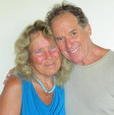For a relationship to be healthy, both partners need to be willing to take responsibility for their own part in an argument. This is sometimes very difficult to do. It is always easier to see your partner’s fault than your own. If you’re angry or defensive in a situation, look deeper and you will find your part. Joyce and I sometimes tell the following very humbling story in our workshops to illustrate mutual responsibility:
We were in Maryland to lead a workshop on living from the heart. It was Saturday morning and we had about an hour before our host would be driving us to the workshop. We love to go for walks, and so we left for a nearby park. We found a trail wide enough for us to walk side by side. The conversation was light at first, but then Joyce started talking about an incident in her childhood. She was remembering some-thing painful, and tears came into her eyes while she spoke. At that exact moment, I noticed something shiny on the ground, and stopped to pick it up. In the few seconds it took to clean off the dirt and see that it was only a shiny, but not particularly valuable, pen, Joyce had fully entered her vulnerability. She needed me to comfort her, and stopped and turned to the side to let me know this. But I wasn’t there! She turned back and saw me rubbing something in my hand.
By the time I approached her, and before I had the chance to explain why I had stopped, she was hurt about my abandonment of her. I immediately got defensive. In the next few minutes, we quickly cycled to a very low place of blame. Unfortunately, that’s how we arrived back at our host’s house, minutes before we needed to leave for the workshop. Although we were not actively arguing in front of our host, we were both upset.
We got into his car and were backing down his driveway when he suddenly stopped and noticed something on the driveway in front of his car. Unbelievably, he said, “It looks like there’s a pen on the driveway. Do either of you want it?”
“NO,” I nearly shouted with perhaps a little too much vehemence. Our host looked somewhat surprised before he resumed backing out of the driveway.
It was a workshop leader’s worst nightmare. Joyce and I arrived completely shut down to each other. We managed somehow to say a few welcoming words, then quickly paired everyone up with instructions to talk about why they were there. The two of us found a vacant spot on the floor, sat down facing one another, feeling tremendous pressure to work things out so we could lead the workshop. It was painful to see the occasional questioning and concerned glances from participants.
After about twenty minutes of trying, we finally were able to communicate the hurt behind the anger: Joyce’s feeling of abandonment and my hurt from being accused of abandoning her. I was then able to apologize for not being aware of her vulnerability when I stopped to pick up the pen. And Joyce was able to apologize for not making sure she had my attention in her vulnerability. The moment we both took responsibility for our own parts of the conflict, the storm was over. Smiles popped up on both of our faces. Love crept back into our hearts. We held each other in an embrace of gratitude.
Now we owed an apology to the group. We called everyone back together into one group, and told them what had happened to us that morning. We did not expect, however, the response from the group. A number of the group were very aware of our conflict. They felt it rather than understanding the details. People were grateful for our honesty and vulnerability. Some shared their pain of growing up in homes where blame and anger were the rule, and nobody ever took responsibility. One person said, “This is the best role-modeling I have ever seen in my life. I’ve gotten my money’s worth out of the workshop in less than an hour. I can go home now.” Everyone laughed.
If you take responsibility for your own issues, rather than blaming your partner, you become a powerful person. Insist upon your innocence when you are in conflict with a loved one, and you become weak. Insist upon your victim-hood and you become even weaker.
Taking responsibility is not about blaming yourself or labeling yourself a bad person. It’s not about guilt or shame. You take responsibility best by seeing yourself as a good person who has made a mistake. In fact, you are a beautiful divine being having a human experience. Knowing this truth, it becomes easy to take responsibility for any mistake – and admit it.
Joyce & Barry Vissell, a nurse/therapist and psychiatrist couple since 1964, are counselors near Santa Cruz, CA, who are widely regarded as among the world's top experts on conscious relationship and personal growth. They are the authors of The Shared Heart, Models of Love, Risk To Be Healed, The Heart’s Wisdom, Meant To Be, and their new book, A Mother’s Final Gift: How One Woman’s Courageous Dying Trans-formed Her Family.
Call Toll-Free 1-800-766-0629 (locally 831-684-2299) or write to the Shared Heart Foundation, P.O. Box 2140, Aptos, CA 95001, for free newsletter from Barry and Joyce, further information on counseling sessions by phone or in person, their books, recordings or their schedule of talks and workshops. Visit their web site at SharedHeart.org for their free monthly e-heartletter, their updated schedule, and inspiring past articles on many topics about relationship and living from the heart.

Post new comment
Please Register or Login to post new comment.